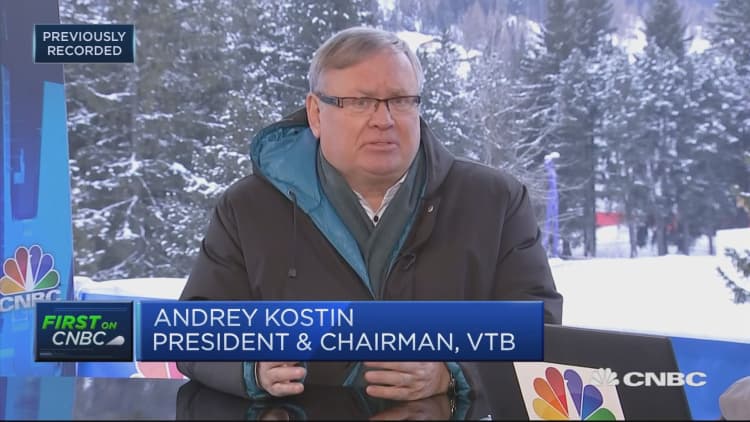Constitutional reforms in Russia were a surprise to everybody and only President Vladimir Putin knows if he will carve out a niche for himself once his presidency ends in 2024, Andrey Kostin, president and chairman of Russia's VTB Bank, told CNBC Tuesday.
Russia saw extreme political upheaval last week with Putin announcing constitutional reforms that ostensibly increased the powers of Russia's parliament and diminished those of future presidents.
The announcement led to the resignation of government — apparently in order to facilitate the reforms — and the installation of new Prime Minister Mikhail Mishustin (previously the head of the Federal Tax Service that he was widely praised for modernizing) after Dmitry Medvedev resigned.
A key part of the plans would beef up the powers of the State Council, a largely ceremonial advisory body led by Putin, leading Russia watchers to speculate that Putin is preparing to extend his influence over the country when his current presidential term ends in 2024.
But Kostin, who leads the majority state-owned bank which is the second largest lender in the country, said the reforms were "unexpected for everybody" and they did not necessarily mean more powers for the president.
"Presidential power in Russia is very big, it's probably much bigger than in America as we see now, but I think to a certain extent those constitutional reforms will give more powers to other bodies rather than the president," he said.
"Why was it done? Well, Putin explained that it was a next step in developing the Russian constitution and Russian state. Whether he sees any niche for himself (after 2024), nobody knows except him probably. It's too early to say because he still has four years to serve."

"It was extremely unexpected for everybody, again, maybe except for Mr Putin," he added.
A new government is expected to be announced later Tuesday and Kostin expected more than 50% of ministers to have changed. "(There are) about 30 members of the cabinet in Russia and I expect more than half to have changed."
"I think we'll see many new faces, many younger faces, and there's a new prime minister who's a technocrat with a very digital thinking which is also important because Russia has a very ambitious program for a digital economy in the next five years."
Kostin believed Putin wanted a revamped government in order to help implement an ambitious program of national projects in Russia, across a range of spheres, to bolster the economy.
"The Russian government is expected to spend at least $300 billion for the next five years in investing in the key sectors of the Russian economy, including infrastructure, medical care, education and many other things, and I think he (Putin) would like to see a more dynamic development of these projects ... I think this new government will have a new start and we'll see more changes in the Russian economy."
Russia's central bank forecast for gross domestic product (GDP) growth is hopeful. It's expecting growth to gradually increase from 0.8-1.3% in 2019, to 2–3% in 2022.
The central bank said in its last interest rate announcement in mid-December that those forecasts should be achievable "should the Government's measures for overcoming structural constraints, including the implementation of national projects, be realized. However, reduced global economic growth expected over the forecast horizon will continue to exert a constraining impact on growth of the Russian economy."






